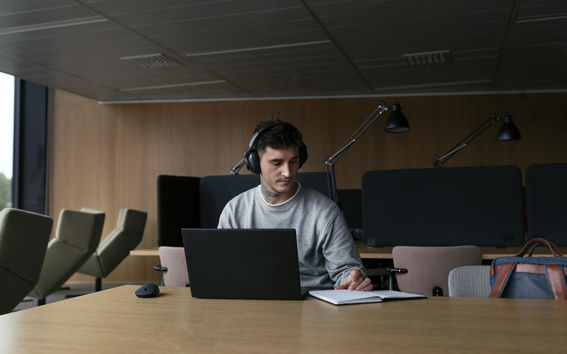Recent study: The COVID-19 pandemic particularly affected the well-being of entrepreneurs under 40 years of age

The COVID-19 pandemic has not only tested the economy of entrepreneurs.
A quarter of Finnish entrepreneurs say they feel very exhausted. According to recent Academy of Finland-funded research by Associate Professor of Entrepreneurship Ewald Kibler (Aalto University), in cooperation with Professor Charlotta Sirén (University of St. Gallen) and Professor Matthias Fink (Grenoble Ecole de Management), many describe themselves as ‘exhausted’ or ‘completely exhausted’. The research team has collected unique survey material on the experiences of Finnish entrepreneurs since the beginning of the pandemic.
Exhaustion was defined in the study as a chronic condition that can be both physical and psychological due to excessive work, personal pressure, and persistent stress.
‘The situation has remained fairly stable since the beginning of the pandemic. The peak level of exhaustion was measured in summer 2021, when we collected survey interview data for the fourth time,’ says Ewald Kibler.
According to the study, entrepreneurs under the age of 40 experienced the pandemic particularly stressful and painful in the first year, and their desire for life and work decreased the most. At the beginning, those over 40 did not experience the pandemic as tiring as younger entrepreneurs.
‘Our results indicate that younger entrepreneurs perceived COVID-19 as a serious threat to themselves. Especially at the beginning of the pandemic, younger entrepreneurs reported more often than older entrepreneurs that they were concerned that they get the coronavirus but also that vaccinations would cause them to fall ill and that they would lose their functional capacity. The difference in sentiment among entrepreneurs of different ages narrowed, even disappeared, and the satisfaction of entrepreneurs of all ages with their lives decreased as a whole.’
During the pandemic, there has also been discussion over how the uneven distribution of domestic work, especially childcare, has posed additional challenges to women's work.
The research did not bring up this point in relation to the exhaustion of entrepreneurs.
‘Female entrepreneurs did not report more exhaustion or less job satisfaction than male entrepreneurs,’ says Kibler.
Surveys continue
By February 2022, researchers had interviewed entrepreneurs five times. The first round of survey took place in April 2020 only a month after the World Health Organisation (WHO) had announced that the COVID-19 had spread into a pandemic. In 2020, entrepreneurs were interviewed twice more on how business reacted to the pandemic after the initial shock. In 2021, there were also two survey rounds, which addressed the long-term consequences of the pandemic. The next survey, in February and March, will focus on the impact of the omicron wave on the coping of entrepreneurs.
The study includes 117 companies, half of which are located in Southern Finland and one third in Western Finland.
The age of companies varies from young growth companies to companies founded 80 years ago. The average age of companies is over 20 years and they employ an average of 21 people. Almost half (45.6%) of the companies are family businesses and 60% represented service business. Men account for 61.6% of the survey respondents and women for 38.4%. The average age of the entrepreneurs is 51 years and they have worked as entrepreneurs for an average of 11 years.
The study is funded by the Academy of Finland.
Further infomation:
Read more news

Significant donation to boost pavement engineering research and education
Companies and associations in the field have donated €400,000 to the School of Engineering.
Design strengthens industrial competitiveness – human-centered factory work at the core
Factory work is undergoing a transformation: new technologies and artificial intelligence are changing the content and roles of work. Aalto University’s Department of Design is studying this change from a human-centered perspective in the HiFive project.
Learning to slow down: cold-water swimming benefits explored in new study
Swimming in cold water offers a temporal slowdown, promoting stress management and mental clarity that lingers long after the experience, says research from Finland.






